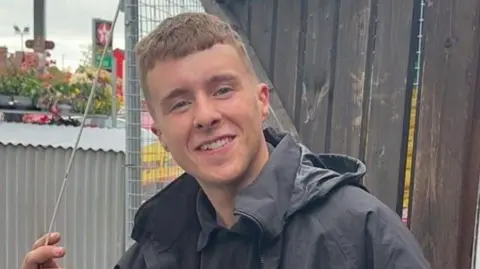 Tom McGrath
Tom McGrathThe father of a man who killed himself after becoming addicted to cocaine, is calling for automatic custodial sentences for those caught dealing the drug.
In May the National Crime Agency made the largest seizure of cocaine in Northern Ireland at Belfast Port.
Police have warned that organised crime gangs are “taking advantage” of the Common Travel Area, which allows free movement between the UK and the Republic of Ireland.
Tom McGrath’s 22-year-old son Matthew had been using cocaine for several years when he was found dead in the garage of his mother’s home in County Armagh in February 2024.
Speaking to BBC Radio Ulster’s Good Morning Ulster programme, Mc McGrath said his son’s mood could change greatly from “hyper” to “very emotional”.
“Many a time he would have lain on my shoulder, crying and saying: ‘I can’t get off that, I can’t get off that.’
“It wasn’t a cry for help… he’d just had enough,” he said.
Mr McGrath asked the priest at Matthew’s funeral to talk about the dangers of cocaine and his son’s own battle with drugs.
 Tom McGrath
Tom McGrathMr McGrath said he is particularly concerned that many people who deal drugs do not end up serving jail time.
He said: “How many times do you see them going before the courts and getting custodial sentences?
“The dealers and suppliers aren’t being prosecuted properly.”
In the UK, cocaine is classified as a Class A drug. Class A drugs are considered to be the most harmful and attract the most serious fines and punishments.
In April, six men, who the Police Service of Northern Ireland (PSNI) said were involved in organised crime, were given suspended sentences despite being linked to seizures of cocaine worth hundreds of thousands of pounds.
However, the police would not say whether they felt that was an appropriate deterrent.
Det Supt Avine Kelly, from the PSNI’s organised crime branch, said that she could not comment on sentencing.
“Judiciary have sentencing guidelines that they work to and that is not a matter for policing,” she said.
“I suppose the deterrent from a policing perspective is that we are actively seeking to locate, arrest, charge and bring drug dealers before the courts.”
What are the maximum sentences for drug dealing?
The maximum sentences for intent to supply drugs are:
- up to life in prison, an unlimited fine or both for a Class A drug
- up to 14 years in prison, an unlimited fine or both for a Class B or Class C drugs
The Lady Chief Justice’s Office said in calculating a sentence for any offence a judge will consider all evidence as well as “the relevant statute and case law”.
They said that the judge would also consider “whether the offender pleaded guilty, the level of culpability, the offender’s previous convictions, and any other aggravating or mitigating factors”.
In relation to drug dealing offences, they added that “level of involvement, the circumstances of the supply, its scale, frequency, duration, the sums of money involved and the offender’s previous record” would all be considered.
Drugs problem getting worse
Addiction charities claim cocaine is being used widely as a party drug and by street users.
Pastor Brian Madden, who offers support to addicts in the centre of Belfast, said the city’s drugs problem is getting worse.
He claimed the availability of drugs is obvious in bars, as well as on the streets.
“Years ago people went out and had a pint, now they go out and have a line of coke,” said the pastor, who leads the Teen Challenge outreach team,” he said.
“Once people someone gets addicted to it, it costs them a blind fortune.
“I’ve been with people who’ve lost £26,000 in a couple of months.”
Alex Bunting from the charity Inspire, which works alongside people living with addiction, said he had “watched the rise of cocaine on the streets of Northern Ireland”.
He said people move “from experimental to recreational use, then become dependent” and the deterioration in their physical and mental health “creeps up on them”.
“It’s a really concerning drug because it takes hold.”
In May, cocaine with a street value of £18.5m was discovered hidden in the container of a lorry, which was about to board a ferry from Belfast to Scotland.
Det Supt Kelly said these drugs had travelled from France into the Republic of Ireland before being seized in Belfast.
“Criminals are exploiting the Common Travel Area,” she said.
“There are international and trans-national links to the criminals that are bringing drugs into Northern Ireland.”
“But also paramilitaries are involved in that kind of importation, distribution and supply of drugs.”
#Man #calls #tougher #drugs #sentences #sons #death



